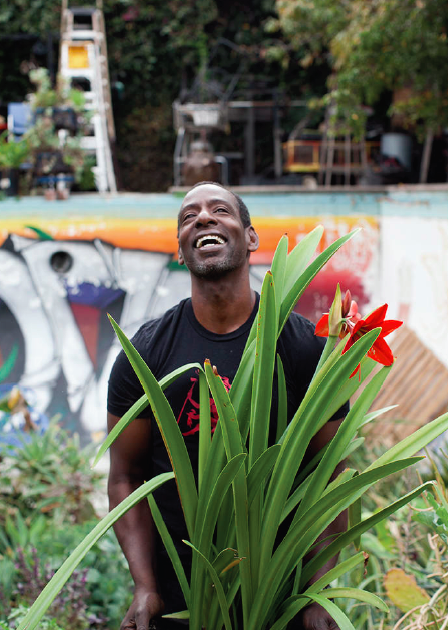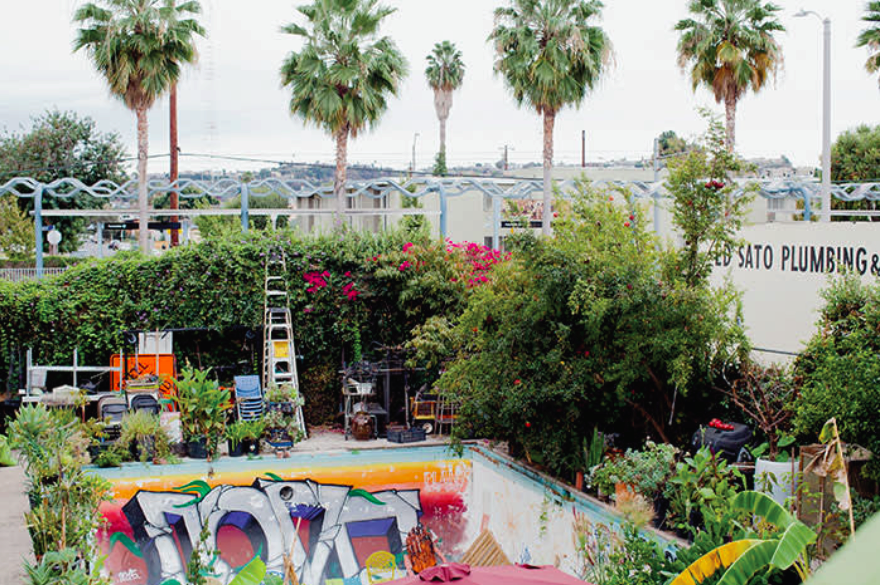"Being a gardener, being educated and building community is gangsta", says LA's 'Gangsta Gardener' Ron Finley
The steady rise of community gardening is a movement we hope is here to stay. We believe it is an attractive, and heathy leisure activity for now - and the future. What will inspire more individuals and communities to take on the "trend"?
One individual that's making gardening cool in the US (and inspiring people world wide) is Ron Finley aka. "The Gangsta Gardener". He's been planting seeds in abandoned lots, traffic medians, along the curbs since 2010.
His home in South Central Los Angeles has become the headquarters of The Ron Finley Project, his latest non-profit organisation, which aims to “ignite a horticultural revolution” in which “gardening is gangsta, where cool kids know their nutrition and where communities embrace the act of growing, knowing and sharing the best of the earth’s fresh-grown food”.
The Financial Times went for a visit in December last year. Here's an extract from the article:
A large swimming pool eats up almost all of his garden. Except that it is drained, covered in graffiti and brimming with food producing plants. There are blueberries, pineapples, chilli peppers, lemon basil, celery and tomatoes. “Growing your own food is like printing your own money,” he often says. If that is true, he is already a very rich man.
Finley, who was born near the Great Lakes into a large family, says that his next mission is to target schools and churches in his neighbourhood, and to whip them into shape. He is unhappy with the food schools serve but also with what — and how — they teach. “Did you do the Petri dish with the seed with the wet paper towel and you watched it grow? What did you do with the seed afterward?” asks Finley, the activist. “They never showed you what that seed becomes . . . so much [sic] of our lessons were not fulfilled.” As for the churches, “do what you’re supposed to be doing in these communities or get the f*ck out . . . you’ve got five churches on one block but there’s not organic food for 10 miles — what’s that about?”.
Last year, his Ron Finley Project managed to buy the house, seeing off a threat from developers that would have forced Finley to leave. A handful of celebrity friends as well as a number of companies, including outdoor clothing brand Patagonia, donated generously to the cause.
The purchase, he says, has provided a secure base from which to continue shaking things up and pushing for change, whatever and however he decides that will be. As he puts it, “people think what I’m doing is about food but it’s not; it’s about opportunity, giving people a shot”.
Finley's argument for community gardening, permaculture and sustainability is so clear and attractive. His TED talk from 2013 is well worth a watch.
Here's a few of his quotes shared on Broadsheet Melbourne:
“We’re in a society now where we take food for granted,” says Finley. “We think it’s just going to be there for us. All you have to do is push a button on an app and it’s delivered to your door. So we haven’t been taught to value food. We’ve been taught to value gold, diamonds. But we need to bring back sitting down at the table and having a meal to celebrate the harvest.”
Finely’s argument for sustainability is more than just knowing what’s on your plate – it’s linked to sustainability. “Everything on this planet should be sustainable,” he says. “It shouldn’t be a catch-word – everything you do should be sustainable. If you take, you should give, period.”
His solution? “Plant some shit,” he says. “That way you know where it comes from. You know what went into it. Mother Nature is the greatest artist there is. You don’t get more gangsta than Mother Nature.”
We're also interested in the political value of gardening. A longer piece on openDemocracy talks of community gardens as a means to make urban politics flourish. They produce places where new social and practical relationships can be (re)built, calling on people to participate and share responsibility for our lifestyles and how we manage resources. The authors use Madrid’s community gardens as an example.
A summary:
Map of Madrid community gardens
Madrid’s gardens have gained significant symbolic power as metaphors for social creativity, for citizens’ capacity to give abandoned spaces back their use value, for caring for nature in the city, and for the building of alternatives by autonomous citizens.
As well as mobilizing alternative ideas and becoming a means of protest, the community gardens have been a valid practical way to bring the organizational dynamics and critical discourses developed by the 15-M movement to neighbourhoods and municipalities.
They are also fostering connections between the various pre-existing group or neighbourhood processes, thus diversifying their participant profile thanks to their constructive and inclusive nature.
Locally, the community gardens bring together a range of feelings, demands and claims (environmental, neighbourhood, political, relational), while simultaneously stimulating processes of neighbourhood self-management. These place an emphasis on direct participation, taking ownership of the space, the rebuilding of identities and the shared responsibility of the community as a whole for the different issues that affect the people who live there.
These exercises in micro-urbanism express people’s disagreement with the dominant model of the city and the lifestyles it induces.
The community gardens are an expression of the emergence of a cooperative urbanism, all about citizen leadership and more democratic ways of understanding the public sphere. The gardens are processes of urban rehabilitation - both in the form of small-scale material changes but also, and especially, in the form of relational rehabilitation: that is, how links are developed among people and between people and their surroundings.
The community gardens act on the production and transformation of the urban space, through their impact on human relationships and lifestyles - rather than via major works of physical refurbishment.
A habitable counter-power is one that allows people to experience in the here and now the major features of the future life to which we aspire. It is process of immanent transformation - one that cannot be reduced to strategic calculations, about the accumulation of forces and irreversible revolutions.
The anarchist Paul Goodman used to say: ‘Suppose you had the revolution you are talking and dreaming about. Suppose your side had won, and you had the kind of society that you wanted. How would you live, you personally, in that society? Start living that way now!’
As a mural in one Madrid community garden says: ‘A garden doesn’t change the world; it changes the people who are going to change the world’. The challenge for these projects is to keep their more political contours without losing their capacity to bring about change.





